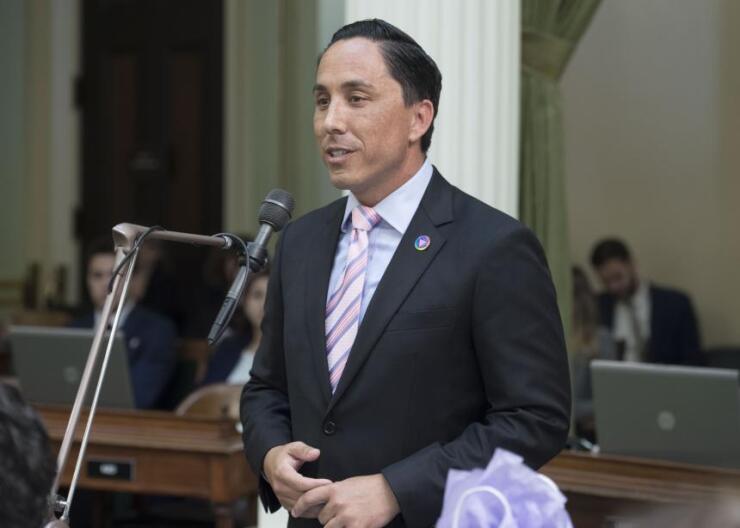The rumors that government finance chief-turned banker Jay Goldstone will retire in early 2020 are not greatly exaggerated.
Goldstone says he means it this time.
He has set Jan. 10, the day before his birthday, as his last day as a managing director working for the public finance group in MUFG America’s Los Angeles office.

Goldstone, 68, a government finance chief many times over, turned banker, said he flirted with the idea of retirement in 2012 after he had spent several years orchestrating San Diego’s shift from a city manager to a strong mayor form of government, a process that also restructured most of the city’s financial functions.
With then-Mayor Jerry Sanders terming out, and a new administration on the way in, Goldstone said he decided it was unlikely he would keep his job.
Goldstone decided to run for chair of the 20-member Municipal Securities Rulemaking Board, the organization that regulates public finance bankers and municipal advisors.
“I knew I would have more time for board business after I stepped down as San Diego’s chief operations officer/chief financial officer,” Goldstone said. “It also would give me a year to decide what I wanted to do next.”
Kevin Dunphy, MUFG's head of public finance, helped make that decision for him, by offering him a position as a managing director in charge of MUFG’s west coast business working with state and local government clients on direct loans and placements, standby bond purchase agreements and other lines of credit.
“Jay seemed too bright-eyed and enthusiastic about the business to be sitting on a beach somewhere reading a novel,” Dunphy said.
Dunphy, who told the Bond Buyer in 2013 after he hired Goldstone that when someone like Jay becomes available you find a place for them, said recently he ended up having to beat off competing offers to hire the former MSRB chair back then.
Dunphy described Goldstone as “iconic.” Colleagues say he will leave a hole in the municipal industry.
Goldstone has been a ubiquitous presence in the industry over the course of his 44-year career, conducting training for the Government Finance Officers Association and serving on taskforces for the California treasurer’s office, including one that looked at best practices following an embezzlement scandal at the Association of Bay Area Governments, a regional planning agency.
“I am in mourning,” said Lisa Smith, a managing director in MUFG’s Los Angeles office. “I am going to wear black all week, the week he retires.”
Smith, who has worked closely with Goldstone since MUFG wooed her away from Siebert, Cisneros, Shank & Co. LLC more than two years ago, said initially she found the idea of working with the former MSRB chair a little intimidating.
She soon discovered that Goldstone had a great personality and was great to work with in addition to being extremely knowledgeable about the sector.
“He’s the best,” Smith said. “What you see is what you get with him.”
Smith has taken on some of Goldstone’s responsibilities, and Nick Boyle, another managing director, also moved from Dallas to Los Angeles two months ago to take over Goldstone’s work as he transitions into retirement, Dunphy said.
Goldstone is known nearly as much for his sense of humor, as for his attention to detail and ability to juggle a myriad of work responsibilities, while serving on industry boards and conducting GFOA trainings.

After describing Goldstone as meticulous, Dunphy related a discovery he made on a visit to Goldstone’s office. As expected, Dunphy said, his desk was neat and clean, except for a large red button that when pushed emits the phrase: “That was easy.”
Dunphy laughed when he recalled discovering the button and thinking about Goldstone pushing the button after completing a complicated financing.
Goldstone has made a name for himself as someone who goes full throttle after positions at cities in turmoil.
“It’s rewarding if you can leave a city better off operationally and financially then when you got there,” Goldstone said.
Earlier in his career, he left a position as assistant finance director of the affluent Santa Clara, California, to work for cash-strapped Richmond, California, for six years.
“It was a step up to finance director from assistant finance director,” Goldstone says of taking the Richmond position, where he also served as interim city manager.
When he left Richmond, which is struggling again financially, to work in Pasadena, California, the city had a $20 million reserve, says Goldstone. He also developed an ongoing five-year financial plan for Richmond, something he did in Pasadena as well.
During his tenure in Pasadena, he guided the city onto solid financial ground while it coped with the challenges presented by energy deregulation.
His biggest challenge in city government came, however, when he went after the chief financial officer position in San Diego, a position created when the city underwent a comprehensive restructuring.
The city had been effectively barred from the municipal bond market for more than five years after a 2004 pension-liability disclosure scandal that resulted in sanctions by the U.S. Securities and Exchange Commission and the withdrawal of the city’s rating by S&P Global Ratings.
“They were going through a lot of problems, lacked financial leadership and couldn’t get their CAFR [comprehensive annual financial report] out,” Goldstone said. “I love challenges and thought ‘what a potential opportunity to go and apply what I have learned over the course of my career.”
He was hired as the CFO in 2006, and was named San Diego’s interim chief operations officer in June 2007, a position that became permanent four months later.
“He was able to jump in, and see where the deficiencies were, based on his background, and he just ran with it,” said Lakshmi Kommi, who was named the city’s first director of debt management during the restructuring, a position she holds today.
In one year, “Jay released four audited financial statements. Before that, the city hadn’t had audited financial statements for two or three years,” Kommi said.
She described Goldstone as being hands-on with good technical expertise, but said in order to pull off what he did in San Diego, he also needed to be a strategic thinker and a leader.
San Diego’s crisis predated the September 2008 crash that started when Lehman Brothers collapsed. The city re-entered the municipal bond market in 2008-09 as the economy was collapsing to sell $1.2 billion to $1.5 billion in current refundings, Kommi said.
When the CFO Goldstone hired retired during his last year with San Diego, Goldstone said, he decided to just work both jobs as Sanders’ term as mayor was drawing to a close.

California Assemblyman Todd Gloria, then a city councilman, designated March 5, 2013
“He was instrumental in spearheading several best practices in the City of San Diego including multi-year forecasting, and formal financial policies for city reserves and bonds,” according to Gloria’s proclamation.
The proclamation also credited Goldstone with restoring investor confidence in the city when it was on the brink of a fiscal cliff and reestablishing the city’s credit rating in 2008, which had been suspended by S&P in 2004.
“He was the right man for the times,” Kommi said. “He really is a collaborator. He has the gift of gab and technical expertise. It’s a good combination.”
When the city created the CFO position, it had all the financial functions including the auditor-controller under the CFO, which helped to ensure appropriate disclosure, Goldstone said.
In addition to lauding Goldstone, Gloria’s proclamation was a bit tongue-in-cheek, saying that Goldstone “met the daily challenges and conflicts in city government with calm, determination and good humor, inspiring his staff to focus on solutions, not politics” and his “positive outlook on all things humans can control was a balm to the staff who were constantly bashed against the rocks of competing egos, politics and uncertainty.”
“He is an industry leader,” Kommi said. “He will be so tremendously missed. He is a man with a lot of gifts.”





